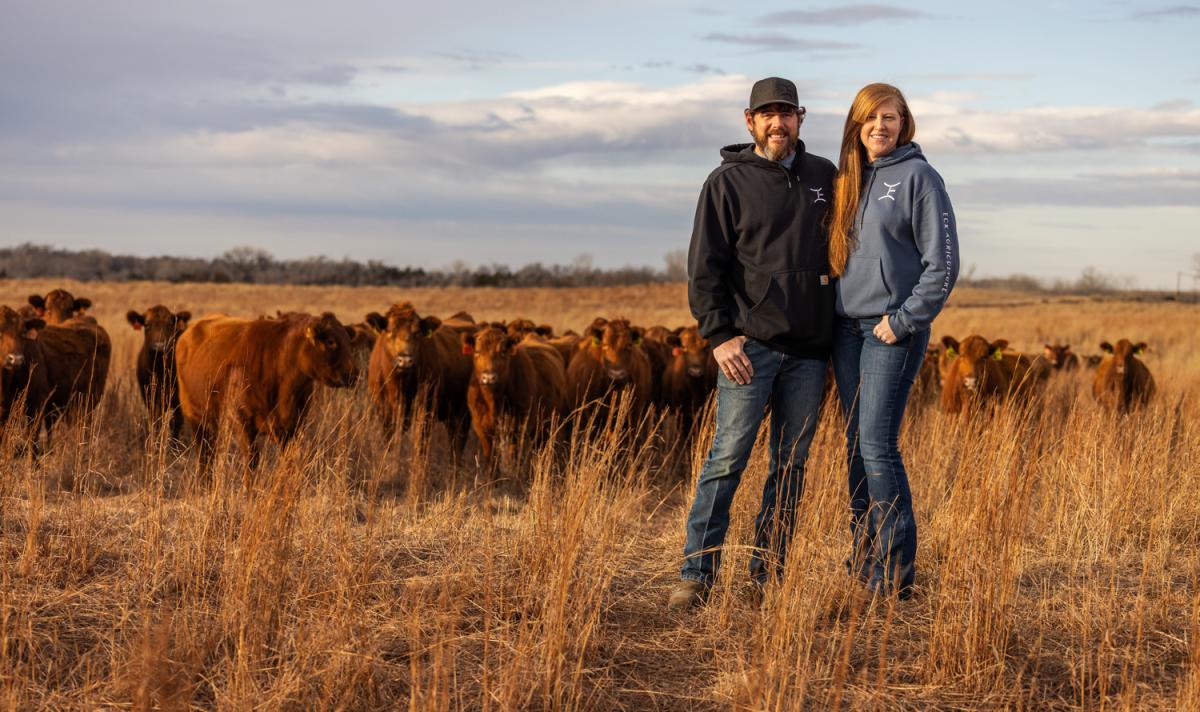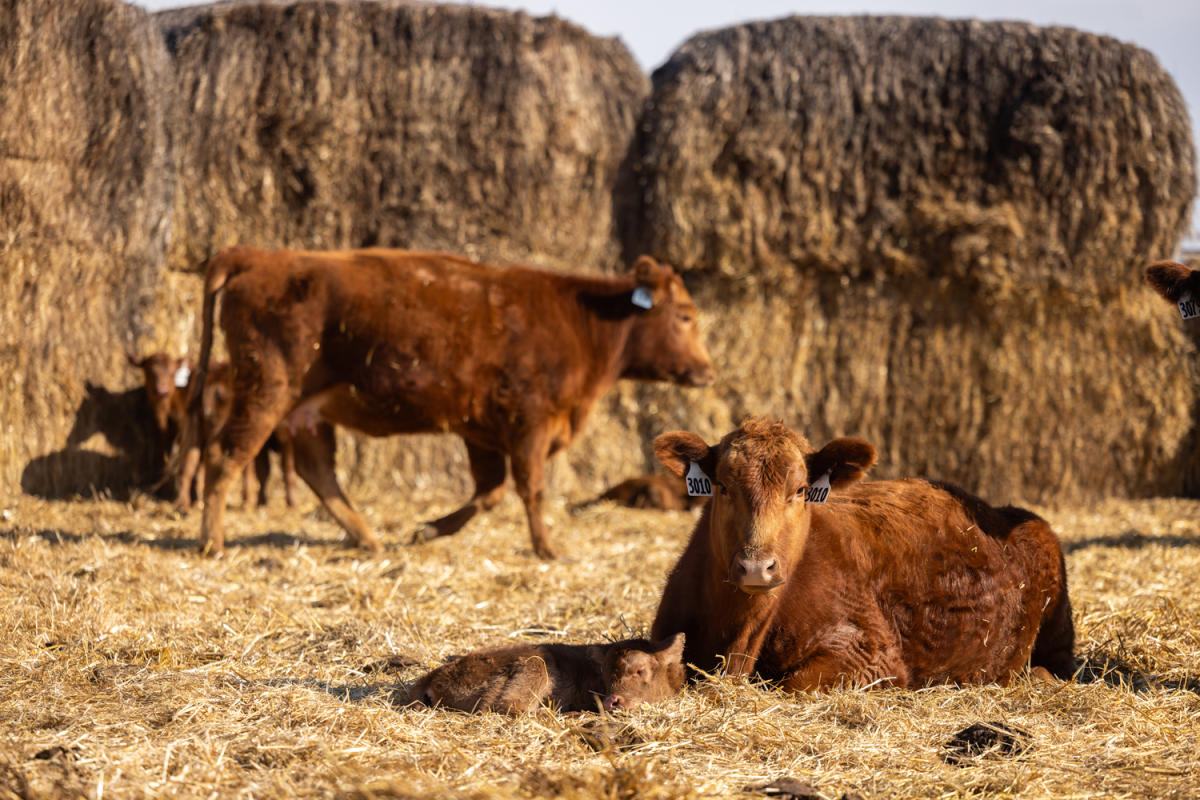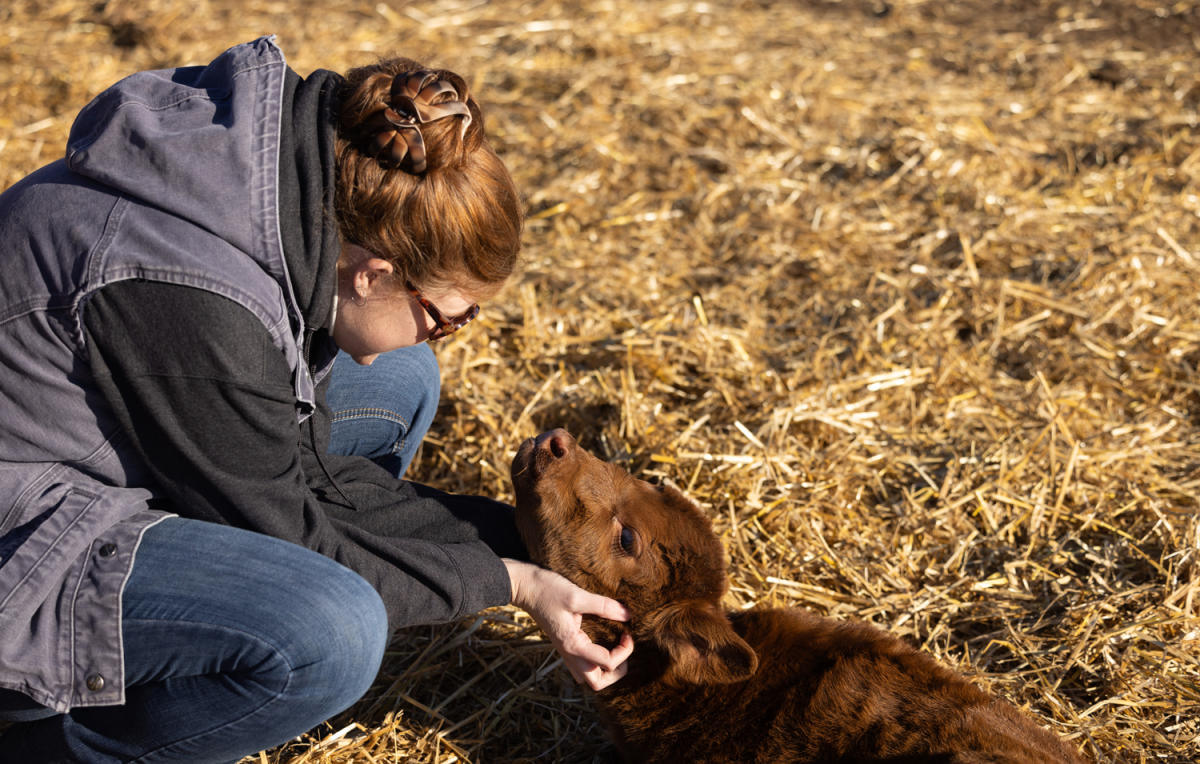 Photography by Aaron Patton
Photography by Aaron Patton
Eck Agriculture continues generations of farming and ranching with direct-to-customer sales and an array of original recipes
Often up before sunrise, Darrin Eck and Beth Covington continue their working days past the normal working hours. For them, farming and ranching on their land in Kingman is a way of life. Their three children, ranging in age from 10 to 18, are also involved in the process. Last summer when rye seed was scarce, 10-year-old Sophia checked the rye’s germination rate, making sure it was field ready.
The family operations, Eck Agriculture, includes 700 head of cattle, a fertilizer and chemical business, a custom cotton-stripping business, and thousands of acres of farmland in Kingman, Barber and Harper counties. Crops include cotton, milo, rye, alfalfa, wheat and soybeans.
“I began following my dad around the farm almost as soon as I could walk,” Darrin, a fourth-generation farmer, says of his introduction to farming. He joined his father, Clint, in business following his high school graduation, and the two of them worked together for a little over a decade until Clint died in 2014.
Darrin credits the success of his and his dad’s expanded operation, at least in part, to being open to new ideas. “I am curious and open to doing things differently. I don’t like to be locked into one thing. My dad might have raised his eyebrows at times, but he, too, was open to new things and was as curious as I am.”
A combination of novel approaches and the pressures of an epidemic caused Darrin and Beth to rethink their cattle operation as the Covid-19 pandemic unfolded. Up to that point, most of their cattle went to local sale barns, but at the beginning of the pandemic while loading cattle to sell, they decided to hold back a portion for direct-to-customer sales.

They’re committed to humane treatment for their livestock and prioritize the well being of the cattle. “Our cattle work hard for us and we try to take the best possible care of them,” Darrin explains.
Covington, a small-animal veterinarian at Skaer Veterinary Clinic, brings professional expertise and concern for animal treatment to her work on the ranch.
Eck and Covington provide their cattle with portable shade structures and use low-stress handling principles. After studying books by Temple Grandin, noted animal behaviorist, Eck used Grandin’s designs to create his own modified processing facility. Based on the natural behavior of cattle, the curved design allows cattle to move easily and calmly. It also means that Eck and Covington can efficiently run a load of cattle through the chutes for vaccination or loading without having to rely on others for assistance.
Certified Red Angus cattle and purebred Akaushi, a type of red Japanese cattle (Wagu), make up their herd. A cross-breeding program using Akaushi bulls yields what Covington points out as “beef that has a high degree of marbling [that’s also] a source of mono-unsaturated fat, a healthier type of fat.”
With the post-pandemic changes, Eck Agriculture’s direct-to-customer sales now make up about 10% of its total beef sales. They challenge people to track and taste the difference between their beef and other meat that might be misleadingly listed as American-grown. “A label may say that the meat was packaged in the US,” Covington says, “but that doesn’t mean that it was not imported.”

Eck beef is traceable, Eck explains. “If you buy directly from us, you have the option of picking your animal.” Calves can even be selected and tagged if the customer prefers certain genetics. Eck records are available that also allow the customer to see an animal’s date of birth, weight at various stages of life, complete vaccine history, and a list of pastures where the animal has grazed until finishing. To further support their transparency, before a steer is slaughtered and processed, it is assigned the name of a country western singer, and the packaged meat carries that name. Krehbiels Specialty Meats in McPherson, Chieftain Brand Meats in Kiowa and Attica Locker in Attica are the Kansas companies that process some of Eck’s beef.
Ribeye steaks are Eck Agriculture’s best seller. “We can’t keep them on hand,” Covington says. Roasts are another matter. Customers purchasing sides of beef often have the roast processed into ground beef. Speculating that people may no longer know how or are choosing not to cook less-tender cuts of meat such as roasts, Covington has created instructional posts on Eck Agriculture’s website. The website also includes a lesson on beef anatomy that points out the various cuts from each section, along with cooking guidelines. Covington creates “Mouthwatering Monday” posts on Facebook each week to share recipes that the Eck family is eating.




